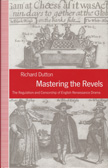"Censorship is a form of repression." Thus begins the introduction to this compelling and detailed analysis of the role of the Master of the Revels—the official censor—in English Renaissance drama. Through a comprehensive, chronological study of the events that marked the careers of the four Masters—Edmond Tilney, Sir George Buc, Sir John Astley, and Sir Henry Herbert—Dutton shows that the Master of Revels was not the agent of a totally repressive government, stamping out creativity on the stage, but rather a person who exercised his own judgment in relation to somewhat vaguely defined standards of what was and wasn't allowed. Mastering the Revels offers a convincing reconsideration of the regulation of performance, one which is able to resist the easy and sweeping attack that has too often been made.
This detailed reconsideration of the regulation of English Renaissance drama is the first study to approach the issue through the role of the Master of the Revels, who censored most late Tudor and early Stuart plays. Dutton convincingly analyzes the control the Masters exercised over the actors in relation to the political context of the court office they themselves held to show that the whole system conspired to permit a wide range of comment on contemporary affairs—all of it properly licensed, suitably veiled and not slanted with offensive particularity at a powerful constituency. Lyly, Marlowe, Shakespeare, Jonson, Marston, Middleton, Fletcher, and Massinger all flourished during this period, due to the Masters' relationship to the patronage pressures and power politics of the court.
Dutton's incisive study allows for a more sympathetic and accommodating censorship about contentious matters than earlier accounts have assumed. Mastering the Revels has important implications for any historical reading of these plays, since it clarifies the terms on which the actors were permitted to be, in Hamlet's words, "the abstracts and brief chronicles of the time."
"Mastering the Revels is a landmark study…For this book is indeed a royal banquet: the food for thought is plentiful, rich, and prepared with great skill by a gracious host."—Medieval and Renaissance Drama in England
"Dutton has written a first-rate, thoughtful book that makes important contributions to our understanding of the regulation of the drama in this period. It is the first study since Chambers's and Bentley's to exhibit a thorough familiarity with the work of previous scholarship, and it significantly raises the ante for anyone else wanting to write on the subject. Building on this foundation, Dutton has recontextualized and reconceptualized old and new questions about the nature and function of censorship. His answers add up to a provocative reassessment of the relationship between playwrights, actors, and authorities, and of the issues surrounding the censorship of Elizabethan and Jacobean drama. It is a book scholars will find most useful."—Shakespeare Quarterly
